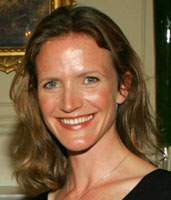This is the second in a series of Edge Videos of "table-top experiments" presented as part of the 2007 Edge/Serpentine collaboration during Serpentine Gallery Experiment Marathon in London, curated by Hans Ulrich Obrist under the leadership of Director Julia Peyton-Jones. Edge presenters were zoologist Seirian Sumner, archeologist Timothy Taylor, evolutionary biologist Armand Leroi, psychologist Simon Baron-Cohen, geneticist Steve Jones, physicist Neil Turok, embryologist Lewis Wolpert, and psycholgist Steven Pinker and playwright Marcy Kahan. The live event was featured at the Serpentine as part of the Edge/Serpentine collaboration: "What Is Your Formula? Your Equation? Your Algorithm? Formulae For the 21st Century."
Writing in Sueddeutsche Zeitung ("Short Answers To Big Questions"), Feuilleton editor Andrian Kreye noted that:
The experiment is not only represents a collaboration by Brockman and Obrist's of their own work; it is also a continuation of a movement that began in the '60s on America's East Coast. John Cage brought together young artists and scientists for symposia and seminars to see what what would happen in the interaction of big thinkers from different fields. The resulting dialogue, which at the time seemed abstract and esoteric, can today be regarded as the forerunner to interdisciplinary science and the digital culture.

